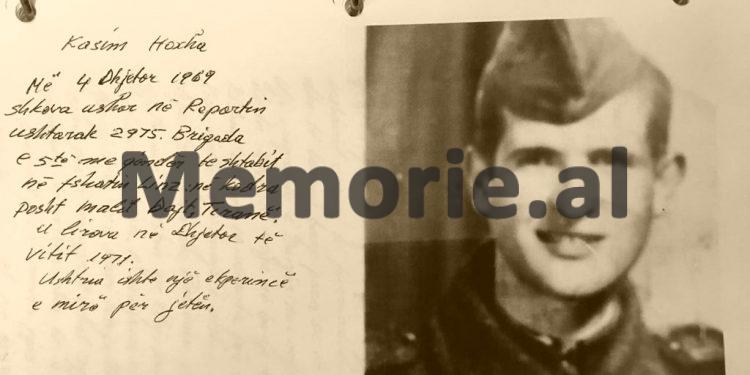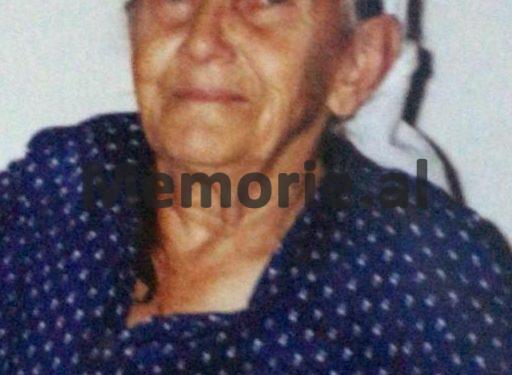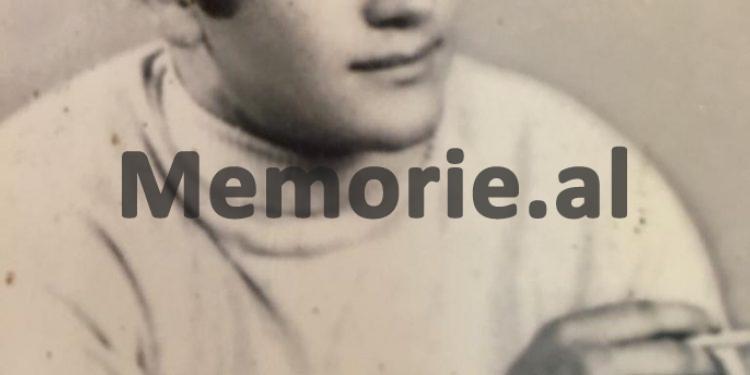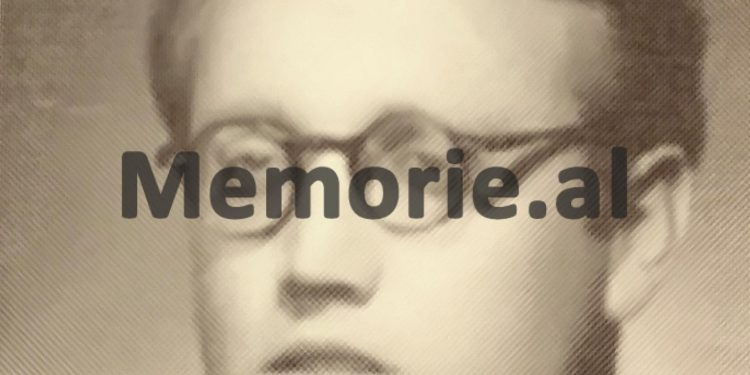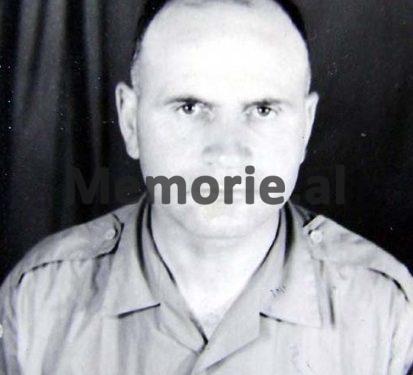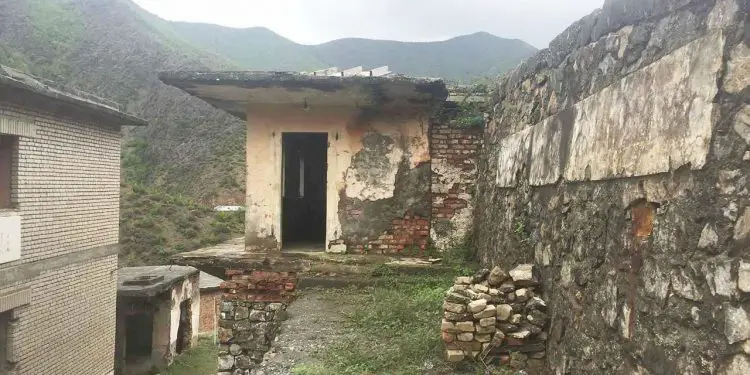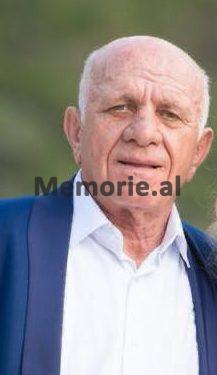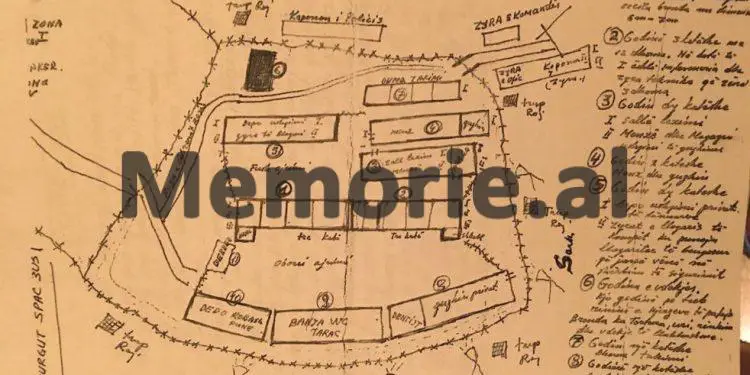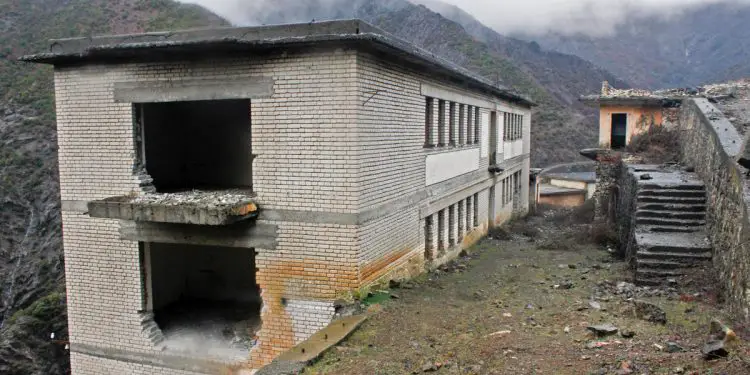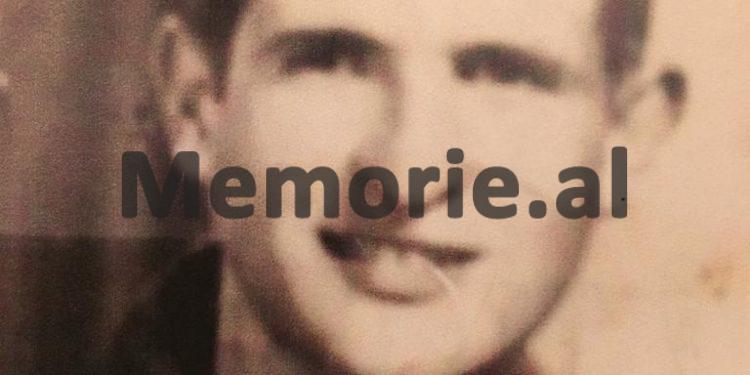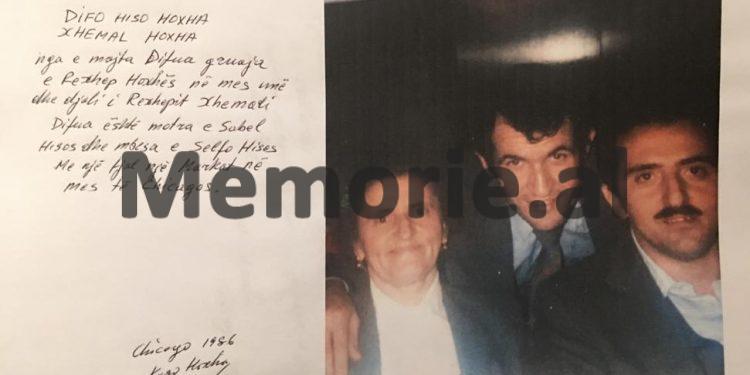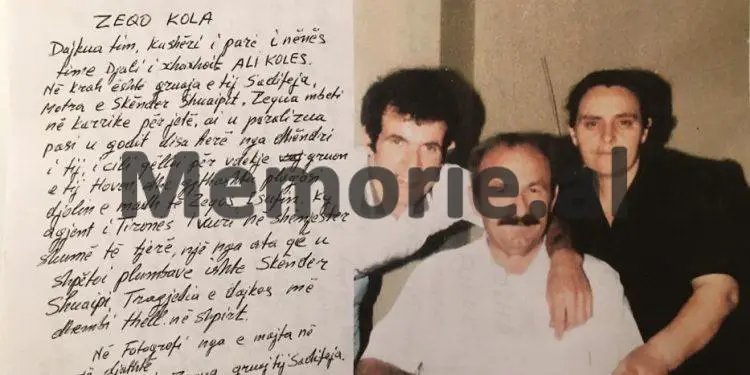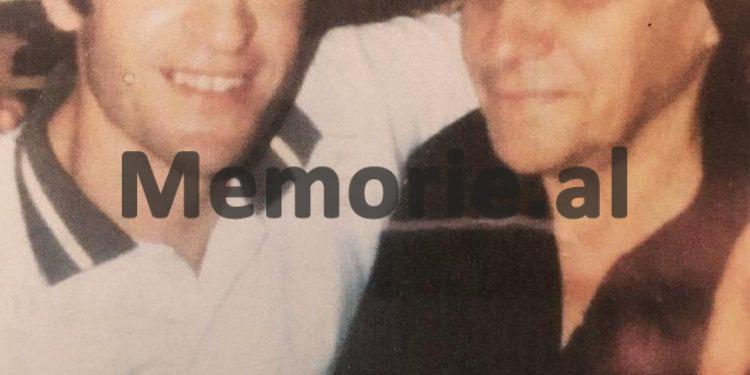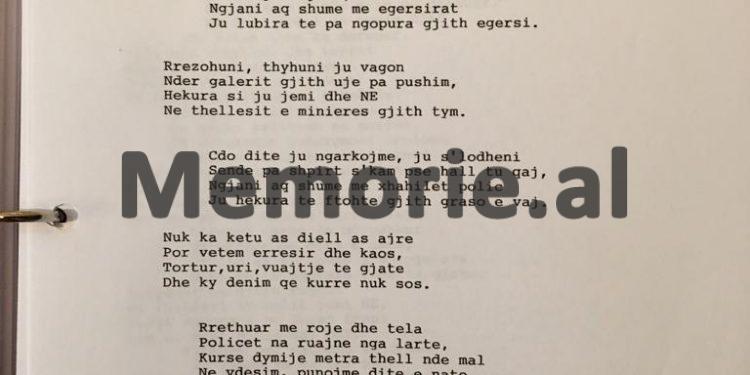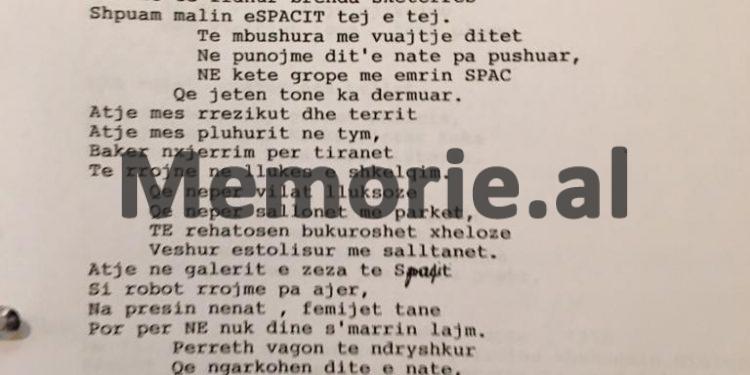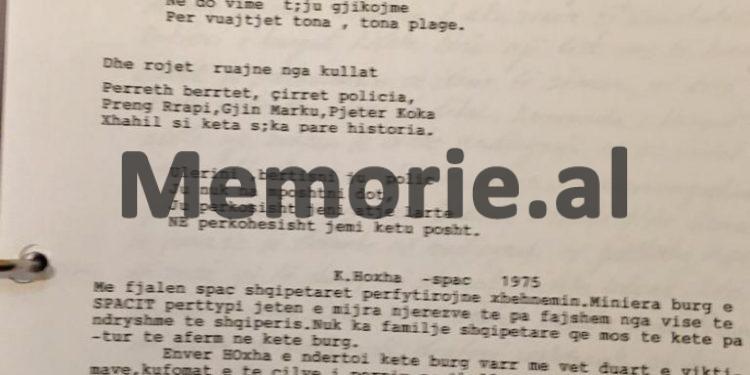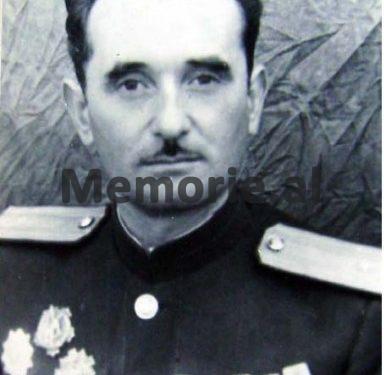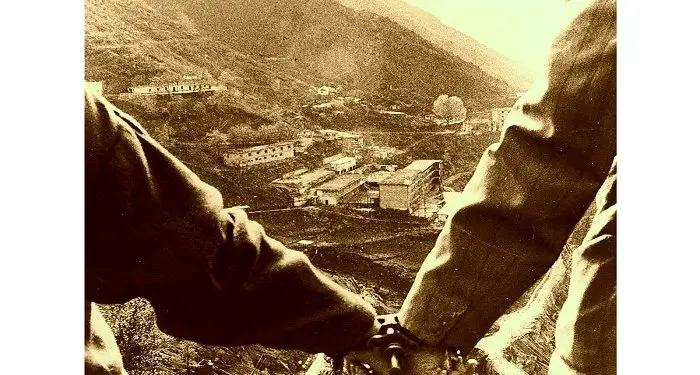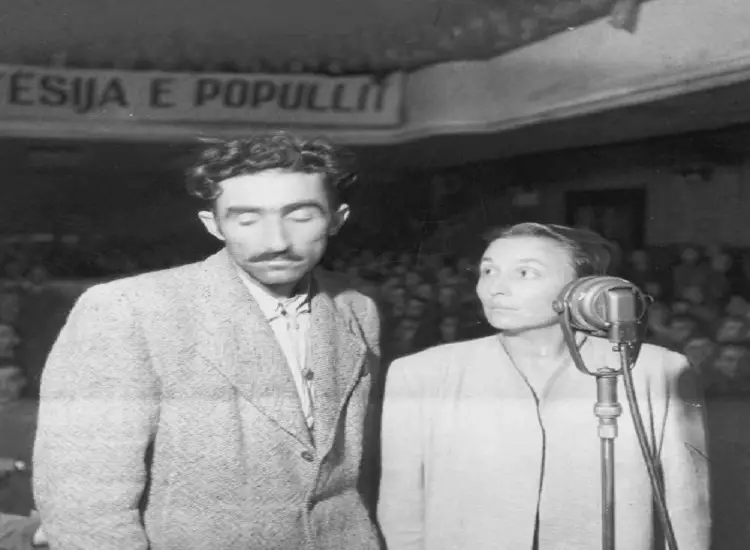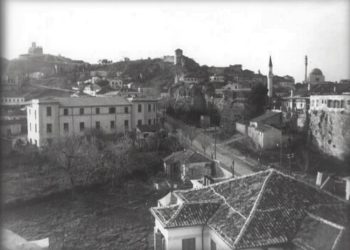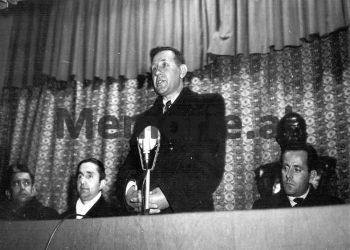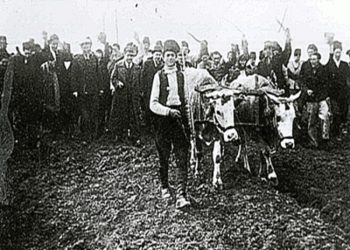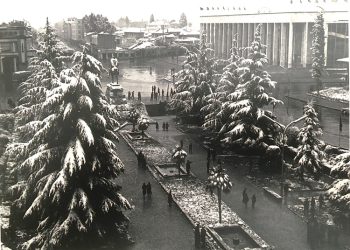Dashnor Kaloçi
part eight
Memorie.al publishes some parts of the voluminous autobiographical book in manuscript “Beautiful land, ugly people” (memories from hell) by the author, Kasem Hoxha, originally from the village of Markat in Saranda and living in the USA since 1985, when he fled Albania after suffering ten years in the prisons of Enver Hoxha’s communist regime. The whole sad and painful story of Kaso Hoxha, from the life and hard work in his village in the southernmost part of the country, the dissatisfaction with the regime and the first poems of a political nature, how they fell into the hands of the State Security and who were his relatives who spied on him, the arrest in the office of the Chairman of the People’s Council of Markat village, by the State Security on June 21, 1973, the investigation in the Saranda Branch of Internal Affairs, the trial against him and the sentence with 10 years in prison for “agitation and propaganda”, staying in “Kaushin” of Tirana (Ward 313), and the prisoners he found there, being sent to Spaç and working in that camp with criminal and “soft” police officers, the accomplices of description of their “portraits” with positive and negative sides, release from prison and return to the countryside, escape to Greece and stay in the Lavros camp, gaining political asylum in the USA, correspondence with Amnesty International, e London branch, inf information with the data he sent to the prisoners of Spaç and the communist regime in Albania, to the creation of a new family and life and work in that distant place with the Cham community divided by the intrigues of the people of the State Security from Albania operating there.
Excerpts from the manuscript book, “Beautiful land, ugly people“, (memories from hell) of the author, Kasem Hoxha, sent by him exclusively for Memorie.al
Prologue
Dear readers!
Do not pay attention to the title I am presenting to you, I mean, if you are not patient to read this collection of memoirs, if you want to forgive the author, that his style is pale, uninspired before this drama of great, of my people, of my martyred nation.
My characters are not created by my imagination, but are real people, they are your brothers, your fathers, your relatives. The events are not fictional, but real and lived. You will convince yourself, only after reading this summary with memories. You will find something from your life, something real from the lives of your fathers, your mothers, your brothers, how they suffered and how they died.
I wrote this collection of memories about the legacy left to me by my friends, for the world to learn the truth, how innocent people were tortured, how they suffered, how they died, in the camps and prisons of the executioner, Enver Hoxha!
I go with the hope that any reader, Albanian or foreign, is not left with hatred, from criticism, beating opposing opinions, as it is the best way to find the truth. The title of the book, “Beautiful land, ugly people”, will anger the reader, but in the end, I will conclude that I have the right to call it “The 45-year era of the satanic communist regime of Enver Hoxha”: Ugly.
I, alas, for the misfortune I had, saw and lived the great drama that happened before my eyes. I am neither a poet nor a orator, I will need hard work to escape the literary mistakes in this historical book, which can inspire future poets and writers, on the tragedy of our time, of the darkest time of my nation !
Ladies and Gentlemen, I wish you all freedom and peace…!
Kaso Hoxha.
Llavrio, Greece 1985
follows from the previous number
I insisted that I found them, otherwise I would put Uncle Idrizi in trouble. He told me that I had violated the prison rule to sentence him to 30 days in solitary confinement, but: “you were reading the works of the Party,” he said, and for that, I was sentenced to only 15 days. He ordered the police to put me in solitary confinement, which was in the neutral zone. Above these, on the terrace stood the guards with machine guns, and the searchlights that made it day and night. There were four concrete dungeons measuring 1.5 meters by 2 meters, without any windows and only with a narrow corridor in front, and the toilet covered with bars. Truly a large cage.
I had heard from the prisoners, that it was a torture that could not be said. If it was winter, take off what you were wearing and leave only the behari shirt and jacket to freeze, being just a convict in the cell. In Behar, which was very hot, they put ten convicts in their cells. During the winter, the prisoners were able to follow the regulations, knowing that a real hell awaited them, and the torture of the cold, made them tuberculous, and sooner or later, go to a grave, who knows where!
Sentenced to prison, with Zef Ashta, half dead!
The policeman ordered me to remove my excess clothes. “I will only wear a shirt, a thin jacket, and summer pants,” ordered Pjetër Koka. It was the end of March and it was very cold. Without objecting, I undressed, if I objected, I could eat wood as well. He put me in dungeon No. 2. Inside was Zef Ashta, a very wise old man, about 75 years old. “What about you”, I asked him “what did you do”?! “Nothing, I was a little late in the toilet and I am freezing here, as I have a week in this icy cell”, Zefi answered me.
This old man had been in prison for more than 25 years. He had been an officer in the time of King Zog. Zefi did not agree with the communists when they came to power and for that he was paying dearly! I spent a week with Zefi in that icy cell. We leaned back to back to warm each other’s gums. The cold had penetrated us to the bone, as an old blanket they gave us at 9pm, and picked us up at 5am, did not protect us at all. Zefi had a fever and probably had pneumonia. He coughed day and night and so did I. Even though we were locked in that concrete cage, they appealed to us whether we were alive or dead!
One morning I could not bear it and told the policeman, “This old man is sick and dying.” The policeman, Preng Rrapi, yelled at me, threatening to hit me with the black rubber band. “How do you think, you were brought here for cavalry?! “Dog, son of a dog, I locked you here to die”, he said angrily and closed the iron door, slamming it hard. I had nothing to say after those words of his and I sat cross-legged on the cement, next to Zef Ashta, who was lying in a fever.
After two hours, the police opened the door of our dungeon. He had brought the prison doctor, and this one a prisoner. Doctor Muhamet Kosovrasti, sentenced to 25 years in prison. The policeman asked: “Who is sick, because you said we are both sick”?! He ordered Dr. Muhammad to see us if we had a fever. Zefi could not stand up. He was about to fall to the ground, but I held him by the arms.
The doctor put the thermometer on Zefi before and noticed that his temperature was 40 degrees. Then he put the thermometer on me and told me that it was coming and going. The doctor told the police that both have a high temperature, while the policeman said he would decide the guard officer, if they would give us medication!
Around dinner, the policeman came again and opened the door of our dungeon. I stood up according to the rules, while Zefi did not. He could not stand, and I was paralyzed. True, working in the gallery was extremely difficult and torturous, but the isolation of the dungeon was even worse. The policeman ordered me to go to the Nursing Home for treatment, and for Zef Ashta, he told the prison trustee, Jorgji Zgur, to bring two prisoners to warm Zef Ashta, who was half dead.
Prison Commissar: The party thinks of prisoners, not like in capitalist countries!
Doctor Muhamet Kosovrasti was waiting for me at the Nursing. The nurse had about ten beds to treat the sick. The prison commissioner, Shahin Skura, always said that: “The party thinks about the health and rehabilitation of prisoners, because our prisons are not like the prisons of capitalism, where prisoners die of hunger”, and other tears of this nature that we we did not eat them easily.
The doctor treated us with antibiotics immediately and asked the kitchen to bring us warm food. Friends of the brigade where I worked, as soon as they found out I was sick and hospitalized in the prison nursing, came to visit me. Everyone brought me food, someone milk, someone made peldes, someone rice soup and so on. After a couple of days, I woke up, I no longer had a fever, but I was afraid they would take me back to the dungeon to finish the sentence.
Thankfully, I do not know if they forgot, or forgave me, but after five days, they left me free to go to the gallery and work. This cold I went through, which was a pneumonia, which damaged my lungs, as the smoke and dust destroyed them even worse, and as time went on my health deteriorated.
I consulted with my friend, Dr. Vasil Zoga, about what I could do to escape working in the gallery. Dr. Vasili gave me some valuable advice, to complain to the Technical Office to tell you that I was unable to work in a copper mine. It was a good excuse, if the Prison Command would approve it, because whoever refused to work, would die in solitary confinement and at the same time be punished for “economic sabotage”!
I complained many times after getting sick several times with high fever up to 40 degrees. My lungs were bad, because when I coughed, I excreted secretions and this thing went on for a long time.
My childhood friend, Qani Sadiku, in prison with me in Spaç
One day, in May 1975, Behar Kodra came into the room, a convict who surprisingly knew all the prisoners and this was the prison herald! Behari did not bother to go from room to room, even giving the news of what we had for dinner!
He shouted: “Kasem where are you”? I was reading in my bed. “What happened to Behar?” I asked. “New prisoners came, there are about 15 or 20 and a young boy is looking for you,” Behari replied. I was surprised who this could be and I told Behar to direct him to “Kaushin” no. 7 where I was staying. Surprisingly, someone else informed me in what room I slept.
I could not believe my eyes when I saw Qani Sadiku, my villager, the son of Beqo and Duda, my childhood friend, whom I had not seen since the day he left as a soldier. Qaniu was a year older than me. When he finished the army, he did not return to the village, but there he had two parents and four brothers and a sister. When he came to Spaç, I was so happy that I was close to a man from my village, but at the same time he stabbed me deep in the soul, that he had my fate. I did not like my enemy either, such a fate like this: locked deep in the galleries, all the dust and smoke of Spaç.
Qaniu was very dear to society, for a short time he met all the prisoners of Spaç and could not distinguish friends from enemies. He loved them all equally. He was everywhere, fighting with the police for nothing and everything, especially with the police, Preng Rrapi. So, he spent most of his time in solitary confinement. Remember, once his mother came to the meeting (Dudia), he was sentenced to 30 days in solitary confinement, and the mother had no right to see the boy in the meeting! And indeed, it did. His mother came and did not let her see her son, even though she had traveled three days (from the Saranda Market) to reach Spaç.
Qani’s mother complained to the Command, how was it possible, for what reasons did they not let the boy meet his mother?! They told him: “He broke the prison rules and for this reason, we locked him in a dungeon.” Qani’s mother, terrified, asked the commissar, Shahin Skura: “How is it possible, comrade commander, even though my son is in prison, I do not know, that inside here in prison, there is another prison?! “If I had known, I would not have taken this long way to come here,” Dudia replied with sobs and tears. “We have the regulation and we do not violate the regulation,” Shahin Skura replied. “If you leave the food to him, leave it, we will give it to him when the sentence is over,” Shahini continued. Dudija asked you, if possible, to meet Kasëm Hoxha. She asked the commissar: “I have a villager here, his name is Kaso, can I see him?” Shahin, to show mercy, said to him: “Yes, you can see it, there is no problem.”
The scams of Commissar Shahin Skura, for my friend’s mother!
The prison warden, Jorgji Zguro, called my name, telling me to report to the guard officer. I wondered why they were looking for me, since I had not broken the rules?! I went out to the post-block gate, and what did I see?! Mother Dudia, dressed in black, stood on the other side of the bars!
I greeted him. Qani’s mother cried with tears and asked me: “Where is Qani”?! I had no answer for that crying mother! I cried too. I believed that it was a good answer to understand what Spaç meant, saying: “Courage, say goodbye to everyone. Farewell! ”
The policeman watching the meeting ordered the wretched old woman to leave. I took that bag of little food he brought to Qanina and put it in the food depot. Qaniu came out of the dungeon after a week, bone and skin. I told him about the painful meeting with his mother. “They are very dirty,” Qaniu exclaimed. After the evening appeal, as always, they read to us for hours sitting in line, the works of “Comrade Enver” and when he finished reading, A. Xh. came out on the stairs in front of us, Commissar Shahin Skura. Every day he spoke something about the works and achievements of the Party in the years of socialism.
“A few days ago, she came to the meeting to see her son, a patriotic mother, who asked the soldier who was guarding with a machine gun, to let her go to the dungeon, to shoot her son! But we did not leave. “We told her we had laws and we enforced the laws, but she got angry.”
Shahin Skura, with those macabre things that were the offspring of his sick fantasy from the ideology that had indoctrinated him to the extreme, wanted to say to the prisoners: “That, even our families did not love us”! This was a complete idiot and none of the prisoners were deceived by these dockers of this zealous ignoramus.
Many prisoners were seriously ill, as working conditions and poor nutrition made the prisoners “Tuberculosis”. I was one of them, too, as the gallery dust had become like concrete in my lungs. Qaniu always complained of an unbearable stomach ache, perhaps from hunger, perhaps from a possible ulcer.
Although ill, I did not give up, but I studied even more. When everyone was asleep, in my “Kaushin”, I was reading or writing something. My co-worker, Bardhosh Gjonzeleli, never stopped cursing the “larots of Tirana”! He always spoke openly to the prisoners, saying: “Worse than I am, it cannot be done, why should we live like this”, he murmured: “Flies live on the mule’s tail, do we live too?! Is this life”?!
Bardhoshi was a special character and I loved and respected him. I was not afraid. I always gave it to him from my writings, to read with Qanina, rather to supplement or remove something from what I had written. I kept the logs inside the straw of the mattress, as it was too dangerous if the police found them! I could even have been shot for the anti-regime content of Enver Hoxha, as such was “Xhenhemi 303”. They were verses that expressed reality. My decision not to work in the gallery anymore!
In 1976, I decided to stop working in the gallery, claiming that I was ill. This decision had serious consequences. They could have sentenced me to prison, or increased my sentence, accusing me of being a “saboteur”. The prison doctor had made a list of prisoners who claimed to be ill, and Qani Sadiku was on that list. The prison command brought a machine with the equipment to do radiographs, to see if we were really sick, or to do it ourselves, to avoid working in the gallery. Someone had told Qani that before going for a radiograph, he should swallow a black button, which would look like an ulcer in his stomach.
Very good idea. And indeed, so did Qani. He went to the radiograph and the military doctor who did the examination, after noticing that black stain on Qaniut’s stomach, asked him how long he had been ill. Qani replied that he had had a stomach ache for several years. Whereas when I was visited, the doctor diagnosed me and came to the conclusion that my lungs were diseased. It was a small victory for me and Qani, but that did not mean that we would be cured of those health problems!
The prison doctor told us that we had to wait a long time, because the Prison Hospital in Tirana had no place! The command did not remove us from work in the gallery even though we had been diagnosed as physically incapacitated for work. Now I had to take this opportunity, saying that I was sick and as such, I could not work in a dusty and smoky environment, such as the mine where we prisoners worked.
I refused to enter the gallery and was tied to the pole
I could not work in an environment with mine smoke and dust. I refused to enter the gallery. The police, according to their regulations, tied me to bars. The policeman, Mark Marku, was another ignoramus. It was March, and it was cold. He tied me behind the pole with his hands behind my back, without right, so that I would not urinate on my feet. I decided not to work in the gallery, claiming I was sick. But the biggest fear that pushed me to make this decision was the insecurity in that primitive mine, where you go in and you do not know if you will come out alive!
Many comrades died because the mine was uninsured and collapsed where you did not expect it. Better dead in the cell I said, than in that darkness all the smoke. So tied up for hours, my body froze, and I do not remember what happened next. When I was mentioned, I found myself in the dungeon. Next to me was Dilaver Hasa, whom we called “Swede”. He was massaging my frozen body. “Are you saying ‘everything’ here ?!” “I was sentenced to prison because I did not fulfill the norm yesterday,” Dilaveri told me. He was a 45-year-old man, and had not yet weakened. His face still looked fresh and healthy. Very good expression for one, living in Sweden.
In this 1 m and 40 cm hole, I was sent for a month with Dilaver. I learned many new things from the world from a man who had lived it up close. An incredibly valuable piece of information about my deep sleep dreams. Here is what he told me about himself, telling me at length his whole story.
“Kasim, I was in heaven, of my own free will, and I deliberately fled from there, opening with my own hands the gates of hell and….”/Memorie.al
continues tomorrow




